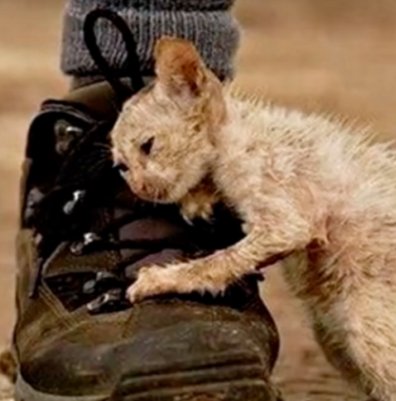“Ugly,” “What in the world is that?”—those were usually the first words people said when they saw him. His name was Ugly, a stray cat whose appearance startled nearly everyone who crossed his path. His fur, once a soft tabby coat, was marred with sores and scars. One of his eyes was missing, and on the same side, his ear was gone as well. His left paw had clearly been broken at some point and never healed correctly, leaving it crooked and weak. His tail was long gone, reduced to a tiny stump that twitched and jerked uncontrollably whenever he moved. Ugly was not the kind of cat people admired from afar or wanted to take home. Instead, he was the type most people avoided, crossing the street or shooing him away as though he carried something contagious. Yet behind that battered, pitiful appearance lived a spirit unlike any other.

Ugly had been abandoned long ago, left to survive on the streets with no one to care for him. His life was a constant struggle, yet he carried himself with a strange kind of resilience. Whenever people encountered him, the response was almost always the same: disgust, fear, or cruelty. Some children were warned never to touch him, as if he were dangerous. Adults threw rocks to scare him away, sprayed him with hoses, or slammed doors on his paws when he lingered too long. If he dared to sneak inside a home, he was chased out with brooms or squirted with water. Still, Ugly never fought back. He never hissed, scratched, or showed malice. Instead, he simply looked up at people with his single golden eye, as if silently asking for kindness.
Despite his hardships, Ugly was driven by three simple joys: eating whatever scraps he could find, engaging in fights when challenged, and, most of all, seeking love. That need for affection never left him, no matter how many times the world turned him away. When he saw children playing, he would rush over with loud meows, pressing his scarred head against their hands or legs, begging for a gentle touch. If anyone picked him up, he would immediately begin to nurse on their shirt or even their ear, like a kitten longing for comfort. It didn’t matter how many times people rejected him—he always tried again, holding onto hope that someone, somewhere, would return his affection.


One day, Ugly made the mistake of showing that love to the neighbor’s huskies. He approached them in his usual way, rubbing against them as if they were his friends. But the dogs responded violently, and the outcome was tragic. From inside my apartment, I heard the piercing screams of a cat in agony. I rushed outside to help, only to find Ugly lying broken and bleeding on the ground. His back legs and lower spine were twisted grotesquely, and there was a deep tear in the white patch of fur along his chest. Rain pooled around him, soaking his frail body. His breaths came in sharp, uneven gasps.
I knelt beside him, heart pounding, unsure how to comfort a creature so badly hurt. Then, in the middle of his suffering, I felt something unexpected: a soft tugging at my ear. Even in his final moments, Ugly had reached up to nurse once more, just as he always did. He bumped his head against my palm, and his lone golden eye met mine. That broken, battle-scarred cat, lying there in excruciating pain, began to purr. It was faint, but unmistakable—the sound of a creature still filled with love. In that instant, I realized I was holding the most beautiful soul I had ever encountered.
Ugly didn’t ask for much, not even then. He didn’t bite me, didn’t scratch, didn’t try to escape. He only asked for affection, trusting me completely to ease his pain. There was no anger in him, no resentment for the life he had been given. There was only love. Moments later, before I could even bring him inside, Ugly died in my arms. I sat there for a long while, holding him, letting the rain fall around us. The world had rejected him, but in those final breaths, I wanted him to know that he was cherished.
Ugly’s story is not just about a stray cat who lived and died on the streets. It is about the extraordinary power of compassion and resilience. Here was a creature who had every reason to be bitter, every reason to lash out, and yet he never did. Despite constant cruelty, he continued to seek love. Despite rejection, he kept offering affection. His life, though filled with suffering, carried a lesson more powerful than anything I had ever read in books or heard in lectures.
Holding him in those final moments, I realized that beauty is not in flawless appearances but in the depth of a soul. Ugly, with his missing eye, broken paw, and scarred body, taught me more about love than a thousand “perfect” creatures ever could. He showed me that kindness is not measured by how much we receive but by how much we give, even when the world gives us nothing in return. He proved that trust can exist even in the darkest of circumstances, and that love, once given freely, transforms both the giver and the receiver.
Ugly may not have had a home, a family, or a comfortable life, but he left behind a legacy. His story reminds us that every living being, no matter how rough their exterior, longs for connection. He taught me that compassion can appear in the unlikeliest forms, and that sometimes the most broken creatures have the most whole hearts. The world may have called him ugly, but to me, he was nothing less than extraordinary. And though his life ended far too soon, his lesson remains timeless: true beauty is found in unconditional love.





